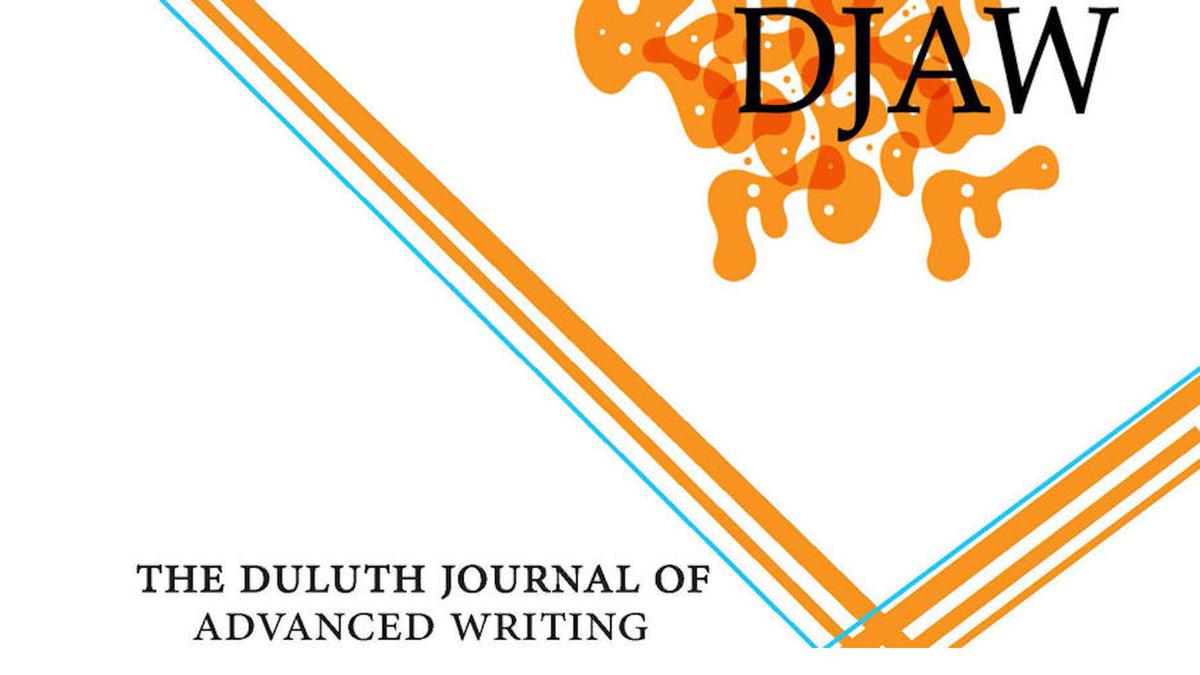The Multimedia Hub buzzes as ten students discuss the pending logo for The Duluth Journal of Advanced Writing (DJAW). Three students gather at a table to experiment with designs. The mouse icon drags across the screen and the cool smell of the air conditioned library fills the room.
Isabel Correia, a student in the Labovitz School of Business and Economics, plays around with the InDesign software and creates an amoeba-like drawing. The bright orange color and organic shapes awe the class. The group gathers around the computer as Isabel enlarges the image on the screen. “Wow,” says one student. “Yeahhhhh,” says another. Glances fly around the room. There isn’t a debate, the logo is decided.
The Making of DJAW
DJAW was created by the Spring 2020 class in electronic publication. The students received help and advise from Professor Elizabethada Wright. The students included Nikolaus Rem, Bee Xiong, Isabel Correia, Jack Harrington, Chance Lasher, Mercedes Lowell, Alyssa Prepodnik, Katie Shampine, Megan Stevermer, and me, Bailey Jacobson.
Wright, a faculty member in the Department English, Linguistics, and Writing Studies, created the class to give students real life experiences in a typical work environment for a writer. She says she wanted them to learn skills that could help them succeed in the professional writing market, “such as teamwork, coordination, and delegation.”
DJAW is an online peer-reviewed journal which publishes articles written and edited by undergraduate students and recent undergraduate alumni from UMD. The mission is to represent the work of undergraduate students as well as publish innovative, original work that advances the field of professional writing.
Wright designed the course based on a previous class, “I worked with Shannon Stevenson and Jennifer Liang in the biology department and Professor David Beard in my department on the Duluth Journal of Undergraduate Biology (DJUB).” DJAW and DJUB were both published by University of Minnesota Libraries Publishing. Unlike DJUB, which only dealt with biology as a subject, DJAW reached out to student writers who had taken UMD’s advanced writing classes or a class that satisfied the advanced writing requirement. DJAW encouraged students to submit an article in a wide range of topics, science: business, human services, the arts, and other fields. Wright was pleased with the submissions. “Some of the students in the advanced writing classes do really amazing work,” she says
Student Experience
Many students experienced “ah-ha” moments during the class. Some of them decided on their future careers and others gained insights into the professional reviewing process.
As a student in the class, one of my “ah-ha” moments was discovering my passion for the marketing side of writing. Creating the journal gave me valuable experience in advertising, design, and technical writing. Advertising the call for papers really stood out for me as we designed posters, flyers, and a press release.
Advertising was key. The eye-catching orange color was a staple in the design process. One student created the QR code that anyone could scan and that gave an easy access link to the journal submission page. The students made sure the design was easy to read, fun to look at, and functional. A digital copy was sent to Kirby Student Center to be displayed on the TV screens across campus and posters were hung up in approved locations. Black and white flyers were created from the posters and handed out to various students who were interested in submitting.
Alyssa Prepodnik,a student from the class, says, “Seeing everyone work together remotely was amazing." UMD went to an online format for the final seven weeks of class because of the COVID-19 pandemic. "We were thrown into a whole new aspect of learning right into the middle of the semester," she says. "We powered through as if we had been doing it for years."
Quinn Heutmaker, a student whose work was published in the journal, enjoyed the experience. "I'm not only a biology major, but I'm working on a professional writing minor. My ultimate goal is to jump into the writing side of the sciences, recording and explaining what research has shown, and looking for places to expand it."
Designing a journal is a rare opportunity and accomplishment for undergraduates. The DJAW legacy will continue both online with future issues and on the resumes of the first class. Wright hopes to give more undergraduates the opportunity in the future.
Students accepted into the first issue of DJAW include:
Maria Bergquist, Chris Braun, Jubran Jindeel, and Tyler Mosby — "Borrelia burgdorferi BB0172 (TTHc:PepB) derivative capacity for immunization: primer for ‘Enhanced protective efficacy of Borrelia burgdorferi BB0172 derived-peptide based vaccine to control Lyme disease,’"
Rian Roy — "Potential Use of Microbiota as a Forensics Tool to Determine a Post-Mortem Interval,"
Quinn Heutmaker — "Pharmacokinetics and Dolutegravir in HIV Treatment Research,”
Alyssa Golden — “Bisphosphonates in improving the osseointegration of dental implants,"
Nikolaus Rem — “Using Comedy to Shape Tragedy in Christopher Marlowe’s The Jew of Malta.”
Learn more about UMD's Department of English, Linguistics, and Writing Studies.
This story was written by UMD student Bailey Jacobson, who is double majoring in English and writing studies. Bailey works with Cheryl Reitan in University Marketing and Public Relations.



